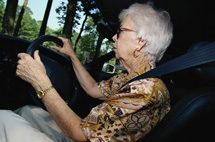“David, we need to talk.” Sue sat down at the kitchen table, coffee cup in hand.
He lowered the Winston-Salem Journal. She had that “She whom one must obey” tone in her voice.
“Lisa says her uncle… he’s 75… has turned in his driver’s license.”
“And…?” David looked at her quizzically.
“Well, Elizabeth is 80 and she’s still driving.”
“Of course, my mother’s driving. Every morning she drives to her office, works all day long, picks up office supplies and goes dancing at night…”
“That’s not what I’m talking about. All right, Elizabeth’s mind is okay and she’s still active; but it’s other things… like her vision, her reaction time… all those things decline with age.”
David grew thoughtful. He didn’t like to admit it, but Elizabeth didn’t have the zest for new ventures like she used to… like her reaction had been less than enthusiastic when he suggested a trip to Europe with his three daughters. She had always delighted in any activity with her granddaughters, even their piano recitals. And she had hit the cement buttress in the Office Depot parking lot last week… a $3000 hit.
“You could be right on some things,” he admitted, “but how do you approach a very active person about how age impacts driving ability?
“Well I don’t want her driving the girls at night, and I told her so. She didn’t like it.”
“Okay. I’ll talk to her too, but don’t go making any rash judgments based on what Lisa says.”
Over the weekend he broached the subject to Elizabeth over a glass of wine. “How is your Volvo holding up? You know it’s ten years old.”
“It’s doing fine, but I would really like one of those little electric cars.”
“No way.” David shook his head emphatically. “They’re not dependable and they’re not safe. Why in the world would you even consider a smaller car?”
“But the gas mileage is great. Sherri gets 52 miles to the gallon.”
“You don’t use enough gas to make it worthwhile, Mother. Anyway, you drive 45 miles an hour and coast most of the time.”
“I do not,” she objected. “I just slow down when it’s a red light ahead to save the brakes, but you know, I’ve been reading about older drivers, there are distinct changes which they may not realize.”
David smiled inwardly. Elizabeth had been a senior for 25 years and she still referred to senior citizens as “they.”
She continued. “I know Sue has been worried about my driving the girls so I ordered a bunch of brochures from AAA. One of them cites ten warning signs that indicate a person needs to curtail their driving.” She delved into her bag and withdrew a brochure which she handed to her son.
While David scanned the list, she added, “I do have difficulty seeing the sides of the road when looking ahead, and it doesn’t mention driving at night. I’m having a little difficulty there too when the road is unfamiliar. So tell Sue I will not drive the girls at night,” She thought for a moment, then added, “Unless it’s an emergency.”
“I knew you would be on top of this, Mom.” He learned over and planted a quick kiss on her cheek. He was relieved that Elizabeth was at least aware of problems. He and Sue could watch for other warning signs, but at least his mother was watching too.
Ten Signs to Limit Driving
- Frequent “close calls” (i.e. near accidents).
- Dents, scrapes, on the car or on fences, mailboxes, garage doors, curbs etc.
- Trouble judging gaps in traffic at intersections and on highway entrance/exit ramps.
- Other drivers honking at you.
- Getting lost.
- Difficulty seeing the sides of the road when looking straight ahead.
- Slower response time; trouble moving foot from gas to brake pedal or confusing the two pedals.
- Getting distracted easily or having trouble concentrating.
- Difficulty turning your head to check over shoulder while backing up or changing lanes.
- Traffic tickets or “warnings” by traffic or law enforcement officers in the last year or two.


